It was probably a mistake to play the Cities: Skylines fishing DLC on a desert map
Nobody could have predicted this.
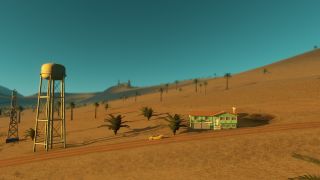
Even after five years of DLC, Cities: Skylines was still missing something—a feature vital to both cities and videogames themselves. I am, of course, talking about fishing. Sunset Harbor finally introduces the fishing industry, letting us exploit our disgusting rivers and oceans for profit and delicious snacks. In theory.
This is Drybone. It's in the desert.
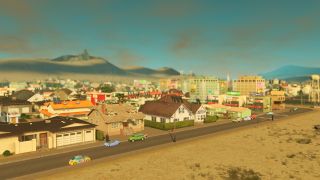
It turns out that there's not a great deal of water in the desert, and this actually makes it quite unappealing for fish. Unless they are sand sharks. But I don't want sand sharks. You can see my problem. As the scrappy young mayor of and up-and-coming town, however, I was convinced I could make it work. Colossal Order wouldn't put it in the DLC unless it was an obstacle that could be overcome.
Unless they wanted to torment me…
The first problem cropped up immediately. The site for my new town was close to exactly one source of water, and it was basically a pond. Not an auspicious start, but fish do live in ponds—maybe it would be enough to start with. Except, the pond also needed to be used for something else just as important.
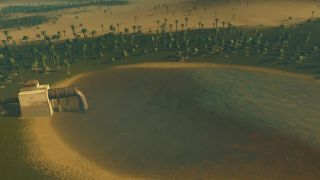
Yes, gallons and gallons of liquid shit. Every game of Cities: Skylines begins with finding somewhere to shoot out a torrent of sewage, almost immediately polluting the water. Before 1,000 residents had moved in, the pristine pond had already transformed into a stinking pool of poo that you could almost certainly walk across.
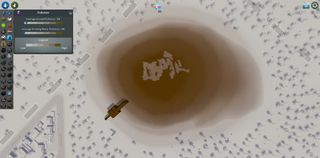
I can come back from this, I thought. Not immediately, though. I was strapped for cash and waiting for more buildings to unlock. But at least the residents of Drybone could sleep soundly at night knowing that their sewage was being spirited away out of view. Well, not quite out of view—everyone in Drybone lived right next to the pond. Initially I thought this would be nice. I've always wanted to live by the water, but all those romantic notions of taking a dip in the mornings and ending the day drinking a cocktail on an inflatable were quickly crushed.
The biggest gaming news, reviews and hardware deals
Keep up to date with the most important stories and the best deals, as picked by the PC Gamer team.
Despite what must have been a terrible stink, people still flocked to my burgeoning town, demanding more and more residential space. They couldn't get enough of it. Pretty quickly the town was large enough to support the beginnings of the fishing industry. Exciting! But while I'm apparently the kind of mayor who has zero qualms about feeding people toxic fish, the people on the boats have stronger ethics. One boat went for a wee jaunt around the pond, but nobody was doing any fishing.
Normally, my only option would be to wait until I could get my hands on a water treatment plant, which would eventually be able to offset some of that pollution. Thankfully, there's a new inland water treatment plant that can be plonked down anywhere. It pollutes the ground around it, but it means that no sewage gets into your water. It's pretty cheap, too, and the additional ground pollution barely had any impact on my already filthy industrial area.
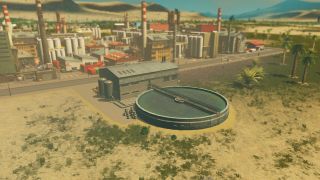
The results weren't instant, but bit by bit I could see the water clearing up, with the brown sludge giving way to more welcome blues and greens. I just stared at the pond, forgetting about all my other mayoral duties, just waiting for the second it was clean enough for the fish and cash to start rolling in. Finally the boat reappeared, and another one, and they started going down their assigned route, gobbling up all of my new scaly friends.
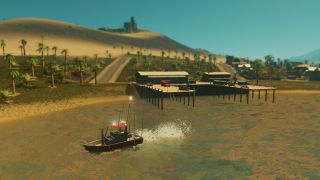
Predictably, however, there was another problem. While I was trying to enjoy the fruits of my labour, Cities: Skylines was more interested in lambasting me for my terrible planning skills. The fishing route wasn't efficient, apparently, so it was taking a long time for my fish stores to fill up. Inefficient routes are too short or too simple, and in my case it was both. I needed more water. Why couldn't it have been sand? I had so much of it, but until the inevitable glass-blowing expansion, it's completely useless.
My population had grown enough so that I could unlock another section of the map, but none of the nearby tiles had any sources of water. I'd need to unlock two of them. Thus began a period of rapid expansion and soaring costs and I attempted to draw in as many idiots to my terrible town as possible. I even remembered to build amenities that had been sorely lacking. Not too many, though; I had to save some cash for my more important projects.
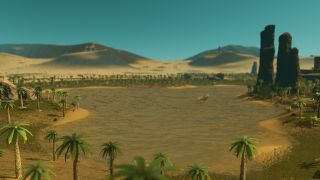
With another tile unlocked, I finally had a second source of water. And a stunning one to boot, rich in both natural beauty and history. Someone else had tried to build a town here a long time ago, apparently, leaving behind some old ruined houses and an abandoned factory. I'd do better.
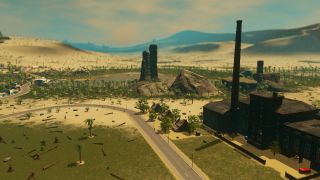
It wasn't long before my second wharf was working away, and this time the boats had a bit more space to fish in—no more inefficient route warnings for me. Things were going swimmingly for the first time, so I was ready to start turning a profit. If I'd seen the other tab that let me build fish markets and factories earlier, I would have probably tried to start sooner.
Even with two wharfs, I wasn't producing enough fish, and once again Cities: Skylines threw it in my face whenever I looked at the new factory. Luckily it was just an issue of manpower, as I didn't have enough people working away on the boats. I needed to build up the second location and try to attract more residents to what was obviously some kind of abandoned mining town.
Cities: Skylines' gormless humans will live pretty much anywhere, so it wasn't long before my wharf was running at full capacity and my factory was churning out "goods" made from fish. I was even able to support a fish market, providing tasty treats to my starving populace directly. Things were actually going well. Maybe the desert isn't so bad, I thought to myself like a man who has definitely spent too much time in the desert.
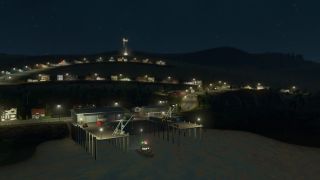
I had some fish, but was it really enough fish? Would there ever be enough? Hungry for more, I swapped my two regular wharfs for some new specialist ones, specifically designed to drain my ponds of anchovies. Every body of water has a particular type of fish swimming in it, and specialising just makes gathering them all up in a big net easier, probably. As I made very clear before, I am not and never have been a fish scientist. I've just played a bunch of Sea of Thieves.
Even with all that, my lust for Omega-3 still hadn't been sated. There were more puddles to exploit and, off in the distance, the mother lode. Yes, an honest to goodness lake. Getting there would take some doing, requiring a much larger population. I built and I built, always with my goal in sight.
I never made it.
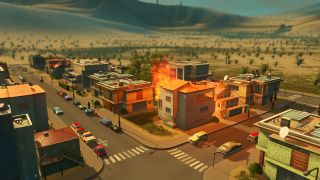
All my attention had been taken up with my dream of building the world's greatest desert fishing company that I'd forgotten all about building a nice town and looking after all the people who put their faith in me, Mr. Mayor. It was only thanks to the complete absence of democratic elections that I'd been allowed to stay in power for so long, but that wouldn't stop my city from turning into a post-apocalyptic wasteland.
Drybone was rife with crime, people lived in constant fear of their homes burning down, everyone was dangerously stupid and my Chirper feed was inundated with complaints I'd been ignoring for years. All the problems had stacked up, and if I continued my course the town would inevitably dry up. It had fish, but it had absolutely nothing else going for it.
I did what I set out to do and found fish in the desert. But at what cost?

Fraser is the UK online editor and has actually met The Internet in person. With over a decade of experience, he's been around the block a few times, serving as a freelancer, news editor and prolific reviewer. Strategy games have been a 30-year-long obsession, from tiny RTSs to sprawling political sims, and he never turns down the chance to rave about Total War or Crusader Kings. He's also been known to set up shop in the latest MMO and likes to wind down with an endlessly deep, systemic RPG. These days, when he's not editing, he can usually be found writing features that are 1,000 words too long or talking about his dog.
Most Popular

